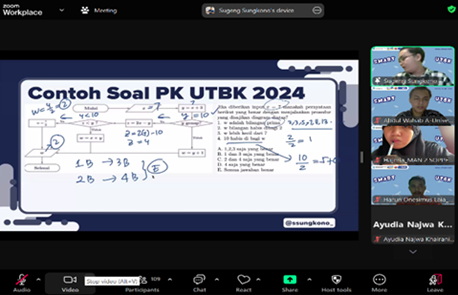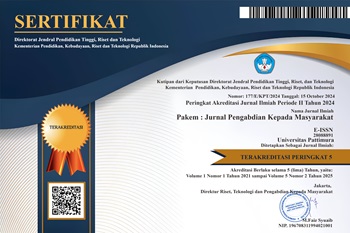PENDEKATAN TERPADU DALAM PERSIAPAN UTBK
MANAJEMEN KECEMASAN DAN PENGUATAN KOMPETENSI MELALUI LATIHAN SOAL UTBK
Abstract
Preparing for the Computer-Based Written Examination (UTBK) poses a significant challenge for high school students, not only in terms of academic mastery but also in mental readiness to face exam pressure. One of the main issues identified is math anxiety, which can disrupt concentration and lower academic performance. To address this challenge, the SMART UTBK program was developed as a comprehensive approach that integrates anxiety management strategies with competency strengthening through UTBK-style practice questions. The program includes educational webinars that discuss techniques to overcome math anxiety and offer practical tips for solving UTBK math problems, as well as online tryout sessions designed to simulate real test conditions. A total of 100 senior high school students participated in this initiative. Evaluation results indicated that over 70% of participants found the math anxiety material helpful in managing excessive exam-related stress and reported improved understanding of problem-solving strategies. The tryout sessions were also considered representative and effective in helping students assess their readiness in a realistic context. This program not only addresses technical knowledge needs but also provides the psychological support essential for students facing university entrance exams. The SMART UTBK program underscores the importance of integrative interventions, demonstrating that equipping students both psychologically and academically can significantly enhance their emotional and cognitive preparedness
Downloads
References
Almarzouki, A. F. (2024). Stress, working memory, and academic performance: a neuroscience perspective. The International Journal on the Biology of Stress, 27(1). https://doi.org/10.1080/10253890.2024.2364333
Aula, S. T., Shifa, R. N., & Aini, D. K. (2024). Analisis Strategi Management Waktu dalam Meningkatkan Produktivitas Belajar Untuk Menghindari Stress Akademik Pada Mahasiswa. Observasi: Jurnal Publikasi Ilmu Psikologi, 2(3), 91–113. https://doi.org/10.61132/observasi.v2i3.467
Barus, D. H. N., & Surbakti, R. (2023). Analisa dan Pengembangan Pemasaran Perguruan Tinggi Di Indonesia. MANNERS (Management and Entrepreneurship Journal), 5(2), 81–89. https://doi.org/10.56244/manners.v5i2.525
Hendrawan, T. P., & Wahyuni, E. (2023). Efektivitas CBT dalam Mereduksi Kecemasan Ujian Tulis Berbasis Komputer (UTBK) SNBT pada Siswa SMA: Sebuah Studi Pustaka. JIIP - Jurnal Ilmiah Ilmu Pendidikan, 6(12), 9685–9689. https://doi.org/10.54371/jiip.v6i12.3298
Inuhan, M., Lekitoo, J. N., Dahoklory, A. S. K., & MA, R. K. (2024). Pelatihan Soal-Soal Olimpiade Matematika Tingkat Sekolah Dasar Pada SD Negeri 325 Maluku Tengah. PAKEM : Jurnal Pengabdian Kepada Masyarakat, 4(1), 59–65. https://doi.org/10.30598/pakem.4.1.59-65
Laja, Y. P. W., & Simarmata, J. E. (2022). Pengaruh Kecemasan Matematika Terhadap Persiapan Tes Utbk Siswa SMAN 1 Kefamenanu. Jurnal Magister Pendidikan Matematika (JUMADIKA), 4(2), 58–64. https://doi.org/10.30598/jumadikavol4iss2year2022page58-64
Luttenberger, S., Wimmer, S., & Paechter, M. (2018). Spotlight on math anxiety. Psychology Research and Behavior Management, 11, 311–322. https://doi.org/10.2147/PRBM.S141421
Ma, X. (2023). The Effect of Psychological Control on Students’ Exam Anxiety. Advances in Educational Technology and Psychology, 7(3). https://doi.org/10.23977/aetp.2023.070301
Owens, M., Stevenson, J., Hadwin, J. A., & Norgate, R. (2012). Anxiety and depression in academic performance: An exploration of the mediating factors of worry and working memory. School Psychology International, 33(4), 433–449. https://doi.org/10.1177/0143034311427433
Putra, A., & Yulanda, Y. (2022). Kecemasan Matematika Siswa dan Pengaruhnya: Systematic Literature Review. Didaktika: Jurnal Kependidikan, 15(1), 1–14. https://doi.org/10.30863/didaktika.v15i1.1148
Sanna, L. J. (1999). Mental Simulations, Affect, and Subjective Confidence: Timing Is Everything. Psychological Science, 10(4), 339–345. https://doi.org/10.1111/1467-9280.00165
Yuni, S. R., Rambe, S., & Gusmaneli (2024). Strategi Pembelajaran Aktif di Madrasah. Journal of Creative Student Research, 2(3), 01–15. https://doi.org/10.55606/jcsr-politama.v2i3.3675

Copyright (c) 2025 PAKEM : Jurnal Pengabdian Kepada Masyarakat

This work is licensed under a Creative Commons Attribution-NonCommercial-ShareAlike 4.0 International License.
Authors who publish with PAKEM: Jurnal Pengabdian Kepada Masyarakat agree to the following terms:
- Authors grant copyright to the journal and right of first publication with the work simultaneously licensed under a Creative Commons Attribution License (CC BY-NC-SA 4.0)
- Authors are able to enter into separate, additional contractual arrangements for the non-exclusive distribution of the journal's published version of the work (e.g., post it to an institutional repository or publish it in a book), with an acknowledgment of its initial publication in this journal.
- Authors are permitted and encouraged to post their work online (e.g., in institutional repositories or on their website) prior to and during the submission process, as it can lead to productive exchanges, as well as earlier and greater citation of published work.

1.png)













